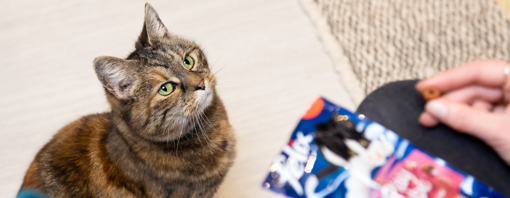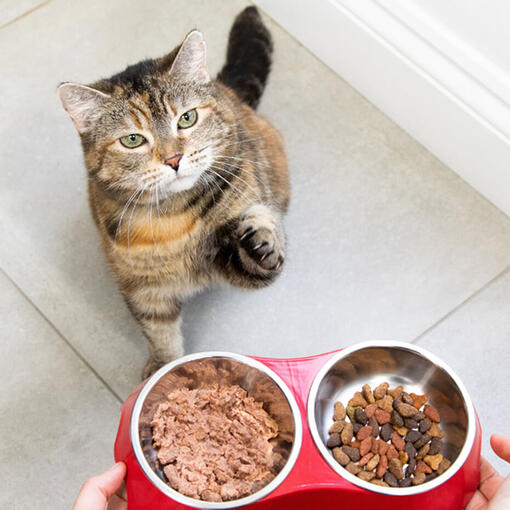
1. Cooked chicken
Plain, cooked chicken is one of the best ‘human food’ training treats you can offer your cat. Other lean meats such as beef, turkey or lamb can also be offered in small amounts, provided they are thoroughly cooked, unseasoned, and served without skin or bones. Take care if your feline friend has a sensitive tummy though as you don’t want to cause any digestive upsets.
When it comes to portion size, think small – tiny pieces or pea-sized chunks are plenty. Because training often involves multiple rewards, smaller pieces help prevent overfeeding. A little goes a long way with cats, and keeping treats in check is especially important to avoid weight gain, which can affect long-term health.
2. Fish
Many cats go wild for fish, making it a powerful motivator during training sessions. Salmon, tuna, or white fish are all good options as long as they are cooked through and served without seasonings. Fish is also a great source of omega-3 fatty acids which support your cat’s skin health, coat and overall wellbeing.
Small, smelly and irresistible, even the tiniest flake can grab your cat’s attention, making it ideal for training. Just make sure to offer fish as a treat, not a staple. as too much can lead to an unbalanced diet or even encourage fussy eating - and a daily salmon habit could quickly add up on your shopping bill!
3. Eggs
Eggs are a safe and nutritious occasional treat for cats. Whether scrambled, boiled, or poached, make sure they are cooked through thoroughly and not runny. Raw eggs should never be given, as they may contain harmful bacteria like Salmonella.
Eggs contain beneficial amino acids that support your cat’s overall health as part of a balanced diet but because they’re rich in fat, it’s best to offer only small amounts; too much egg can upset a sensitive tummy or add unnecessary calories.
Some cats may even develop an intolerance or allergy, so always keep an eye on how your cat responds and check with your vet before making eggs a regular part of their diet.
4. Blueberries
This may sound unusual, but some cats are very partial to blueberries. While fruit isn’t a natural part of a feline diet, these little berries are safe in moderation and their bite-sized shape makes them handy for training. Try offering a single blueberry (fresh or thawed if frozen) and see if your cat eats it (or decides it’s a better toy to chase around the floor!).
Not every feline will be a fan, so if yours isn’t impressed, stick with a more traditional option like chicken. But if you have blueberries in the house it’s worth a try - your cat may surprise you.
5. Cheese
Some cats find cheese irresistible and in tiny amounts it can make a tempting training reward. However, cheese isn’t suitable for every feline. Many cats are lactose intolerant meaning even small pieces could upset their stomach. The same goes for other dairy products such as milk and cream.
Because cheese is also high in fat and calories, it should be considered an occasional treat at most. And if your cat shows any sign of digestive upset, skip dairy altogether.
6. Rice
Plain, cooked rice can be offered to cats in tiny amounts, and its grains make it easy to hand out as a reward. However, rice has very little nutritional value for cats and, unlike meat or fish, it doesn’t have much smell to grab their attention. Since feline appetites are strongly influenced by scent, rice is often less motivating than other options. If you do use it, keep portions to just a few grains but you may find your cat is far more enthusiastic about something meatier.
7. Cat treats
If you really want your cat to pull out all their best moves, nothing works faster than a bag of specially formulated treats. With flavours designed to tempt even the fussiest felines and ingredients you can feel confident about, they’re a convenient way to reward good behaviour.
From the irresistible crunch of Felix cat treats to the health-boosting benefits of Dentalife® Dental Treats, our treats are crafted to combine taste with care. Whether you’re teaching a new trick, encouraging good habits, or simply bonding with your feline friend, our treats help make every moment more rewarding.
Always remember that the cat treats listed above are just that… treats. They should never be given as a substitute for a complete and balanced diet, and it’s important to feed them in moderation. If your cat is overweight, speak to your vet for advice on safe weight-loss strategies and which training treats are most appropriate.
Want to know more about what cats can (and can’t) eat? Check out What Do Cats Eat & Are Cats Carnivores?, next.





